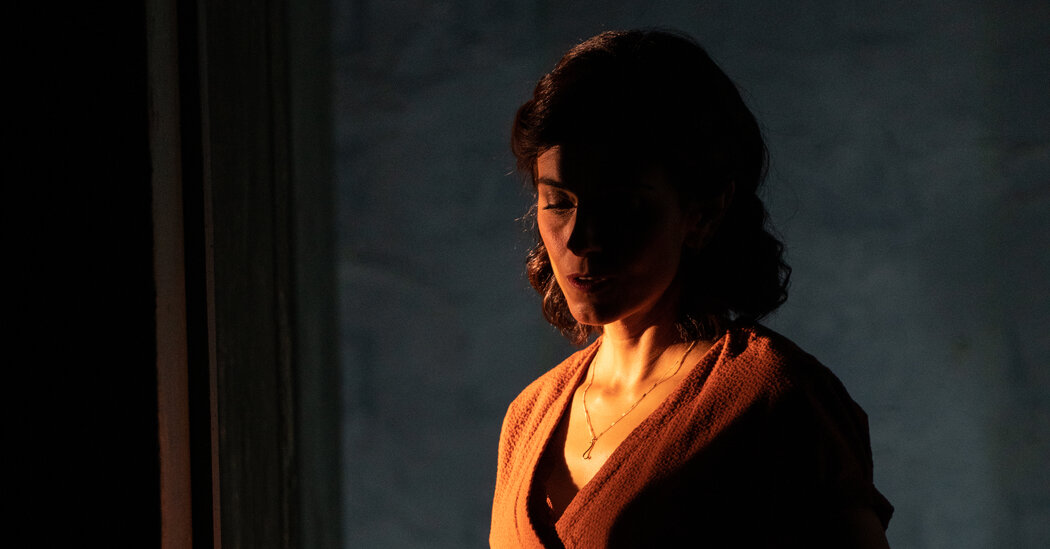
David Cale’s new play, “Sandra,” is packed with classic thriller tropes, as if he had challenged himself to cram as many of the genre’s staples as possible into a 90-minute show — I kept waiting for someone to transfer information from a computer to a USB key as seconds ticked by.
Though this tale of a woman’s search for a missing friend is built using basic potboiler blocks, “Sandra,” which opened Sunday at the Vineyard Theater, is far from generic.
Cale is operating, as he has been for over 35 years, within the parameters of the monologue — a style demanding of writer and actor, and not one usually associated with white-knuckle suspense. He also weaves in the themes that have long permeated his work, including the way people reinvent themselves, often to deal with trauma, and the need for transformation in the face of adversity.
The playwright usually performs his own shows, but here he is lending his voice to another actor, as he did with his 2017 hit, “Harry Clarke,” which starred Billy Crudup and introduced Cale to a wider audience.
Marjan Neshat (“English,” “Wish You Were Here”) plays all the characters, chief among them the narrator, Sandra Jones, a woman in her 40s who owns a cafe in Brooklyn and is vaguely dissatisfied with her life. One day, a close friend, a musician named Ethan, leaves for a trip to Puerto Vallarta, Mexico; he never returns. Ethan’s compositions live on with Sandra (the lovely piano score is by Matthew Dean Marsh, Cale’s collaborator on the 2019 play with music “We’re Only Alive for a Short Amount of Time”), who listens to them often. But physically, it’s as if he has vanished off the face of the earth.
Our heroine decides to look for him, jumping on the first of several flights she will take over the course of the show. Once in Mexico, Sandra — who is separated from her husband and, perhaps, had not realized how emotionally and physically bereft she was — falls for Luca, a younger hunk. He says he’s a student, and glows with a magnetic, insouciant masculinity, with just the right amount of enticing mystery about his background. Luca is a male counterpart to the sultry sirens who have long lured film noir’s male protagonists, and at times it feels as if Cale is having great fun flipping the codes of the 1990s erotic thriller.
Leigh Silverman’s sober staging can dull the impact of the show’s suspenseful set pieces, as when Sandra surreptitiously searches a bag while its owner is in the shower, or when she stealthily records an incriminating conversation on her phone. Thom Weaver’s lighting is the great technical asset, romantically moody in the early stages of Sandra and Luca’s relationship, then suggesting the ominous chiaroscuro of film noir when the plot thickens.
Neshat mostly stays rooted to a spot, sometimes standing and sometimes sitting, and the show feels uninterested in the body as a storytelling tool. The actress is literally at the center of it all, and has been handed a thorny gift of a role that requires the protean ability to portray a variety of characters, including the manager of Sandra’s cafe, an Australian surfer dude and an older gentleman straight out of a Tennessee Williams play. She struggles to differentiate them, and even Luca does not register much as Neshat goes in and out of his accented “potpourri of a voice.”
But she shines as Sandra herself, a woman who was confident enough in her identity to name her cafe after herself but feels adrift, and defined mostly in relation to others. As far-fetched as the plot gets, Neshat is a steadying force, infusing Sandra with a perfectly calibrated balance of anxious hope and effortless warmth — her smile alone is a masterpiece of complexity, in turn melancholy, joyous, triumphant, bittersweet. We immediately understand, for instance, why Sandra throws herself into the relationship with Luca (the reverse is not as convincing).
Early on, Sandra informs us that when Ethan was about to depart for Puerto Vallarta, he told her that they were “so simpatico, if I vanish you’d probably disappear from your life too.” Yet Sandra does build herself out of Ethan’s absence, and even, ultimately, her own.
Sandra
Through Dec. 11 at the Vineyard Theater, Manhattan; vineyardtheatre.org. Running time: 1 hour 20 minutes.